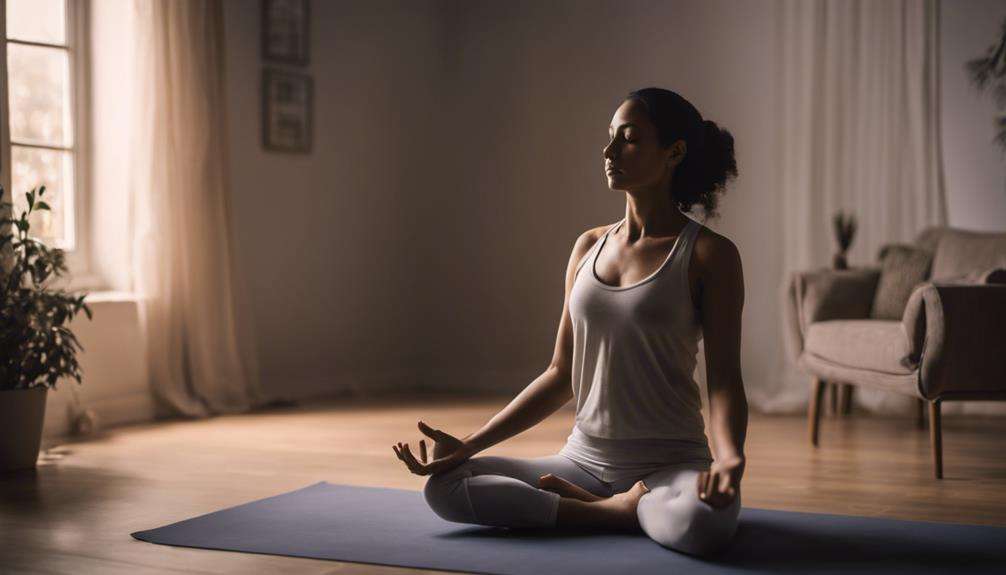If you find yourself tossing and turning at night, struggling to find a restful slumber, there's a way to transform your sleep quality that doesn't involve medication or drastic lifestyle changes. By incorporating mindfulness practices into your daily routine, you can unlock the key to a rejuvenating and peaceful night's rest.
Starting with simple techniques like mindful breathing and meditation, you'll discover a path to better sleep that is not only effective but also sustainable.
Key Takeaways
- Activate parasympathetic system and reduce cortisol for better sleep.
- Engage in yoga and body scan to relax mind and body.
- Practice gratitude and set intentions for peaceful sleep.
- Use mindfulness to transition smoothly into restful sleep.
Mindful Breathing Techniques
To enhance your sleep quality, begin by practicing simple yet powerful mindful breathing techniques. Mindful breathing activates your parasympathetic nervous system, which promotes relaxation and reduces stress levels. By taking slow, deep breaths, you can effectively regulate cortisol levels, aiding in achieving better sleep quality.
These techniques also support balanced hormone production, crucial for maintaining a healthy sleep-wake cycle. Engaging in focused breathing not only enhances your self-awareness and mindfulness but also leads to a calmer mind before bedtime. By incorporating mindful breathing into your bedtime routine, you can smoothly transition into a restful and rejuvenating night's sleep.
Start by taking a few minutes each night to focus on your breath, allowing yourself to let go of the day's stresses and worries. This practice will help you create the ideal mental and physical state for a peaceful night's rest.
Meditation for Relaxation Before Bed
For better relaxation before bed, consider integrating meditation into your nightly routine. Mindfulness meditation is a powerful tool to reduce stress and improve sleep quality.
By practicing bedtime meditation, you can effectively lower cortisol levels, signaling to your body that it's time to wind down and prepare for rest. This practice allows for a smoother transition into sleep, releasing tension in your body and mind.
Studies have shown that engaging in meditation before bed can enhance sleep efficiency and reduce the time it takes to fall asleep. Incorporating bedtime meditation as part of your routine can help you relax, unwind, and let go of the day's stressors, creating an optimal environment for a peaceful night's sleep.
Gentle Yoga Poses for Sleep

Consider incorporating gentle yoga poses into your bedtime routine to relax your body and promote better sleep quality. Gentle yoga, like Child's Pose and Legs Up the Wall, can help reduce stress, lower cortisol levels, and create a calm state ideal for a restful night. These poses release tension, easing physical discomfort that might disturb your sleep.
Poses such as Corpse Pose and Cat-Cow can quiet your mind, calming racing thoughts and aiding in falling asleep faster. By practicing gentle yoga regularly before bed, you can improve your overall sleep quality. Including yoga in your bedtime routine can prepare your body and mind for sleep, ensuring you enter a state of relaxation conducive to a peaceful night's rest.
Mindful Body Scan for Better Sleep
Enhance your sleep quality by practicing mindful body scanning before bedtime to promote relaxation and release tension throughout your body. Body scan meditation involves systematically focusing on different parts of your body, helping you increase awareness, reduce physical discomfort, and calm your mind for a more restful night. Here are three key benefits of incorporating body scan meditation into your bedtime routine:
- Enhanced Relaxation: By tuning into your body without judgment, you can let go of stress and tension, allowing your body to relax fully before sleep.
- Reduced Anxiety: Body scan meditation is known to be beneficial for reducing anxiety levels, which can significantly improve your ability to fall asleep peacefully.
- Improved Sleep Satisfaction: Research indicates that practicing body scan meditation before bed can enhance your overall sleep quality by aiding in sleep onset and promoting a sense of calmness, leading to a more satisfying night's rest.
Gratitude Practice for Restful Nights

Cultivating a sense of gratitude before bedtime can significantly contribute to achieving restful nights by fostering positive emotions and a peaceful mindset. Engaging in a gratitude practice has been linked to better sleep quality and duration.
When you express gratitude, it can lower stress levels, reduce anxiety, and promote relaxation, all of which are essential for improved sleep. Research indicates that practicing gratitude before sleep can lead to more positive emotions and an overall sense of well-being.
Setting Intentions for Quality Sleep
Prepare yourself for a night of restful sleep by setting positive intentions before bedtime through affirmations, visualizations, or calming rituals. When you focus on setting intentions for quality sleep, you pave the way for a more peaceful and rejuvenating night.
Here are three ways to enhance your sleep by setting intentions:
- Affirmations: Repeat positive statements like 'I am relaxed and ready for deep rest' to calm your mind and body before sleep.
- Visualizations: Picture yourself in a serene place, such as a peaceful beach or a tranquil forest, to create a mental environment conducive to sleep.
- Calming Rituals: Engage in soothing activities like gentle stretches, deep breathing, or sipping herbal tea to signal to your body that it's time to unwind and prepare for sleep.
Mindful Journaling Before Bed

Engage in mindful journaling before bed to declutter your mind and promote better sleep quality. Taking time to write down your thoughts, feelings, and reflections can help clear your mind of any lingering worries or stressors from the day.
Research suggests that mindful journaling before bed can reduce bedtime worry, improve sleep quality, and promote self-expression and emotional release. Consider keeping a gratitude journal as part of your bedtime routine to shift your focus towards positive thoughts, fostering a sense of peace and contentment for a restful night.
Journaling before bed can also assist in processing daily events, identifying stressors, and setting intentions for a peaceful sleep. By incorporating mindful journaling into your bedtime routine, you create a calming ritual that signals to your brain that it's time to unwind and prepare for rest.
Give yourself the gift of this self-care practice to enhance your sleep quality and overall well-being.
Frequently Asked Questions
How Can Mindfulness Improve Sleep?
To improve sleep with mindfulness, start with mindful breathing. Scan your body, practice relaxation techniques, and consider sleep hygiene. Incorporate mindful movement, guided imagery, and mindfulness apps. Create a calm sleep environment, reduce stress, and try mindful eating.
How Do You Meditate to Promote Sleep?
To meditate for better sleep, start with deep breathing to relax. Then, try a body scan or progressive relaxation. Mindful movement, visualization, and loving-kindness meditation can also help. Explore mantra meditation, yoga nidra, or mindful walking.
What Are the Benefits of Mindfulness on Insomnia?
To improve sleep quality with mindfulness, focus on techniques like mindful breathing and body scans. These practices can enhance your relaxation response, address stress, and strengthen your mind-body connection, promoting better sleep and reducing insomnia.
Can Mindfulness Replace Sleep?
Mindfulness techniques like mindful breathing and relaxation can enhance sleep quality, but they can't replace the vital role of sleep. Sleep deprivation impacts the mind-body connection, affecting sleep efficiency and patterns. Mindful awareness complements, not substitutes, restorative sleep.
Conclusion
Now that you have learned about the various mindfulness practices to improve sleep quality, it's time to put them into action.
By incorporating mindful breathing, meditation, yoga, body scan, gratitude practice, setting intentions, and journaling into your daily routine, you can create a rhythm that promotes relaxation and restful sleep.
Remember, consistency is key in reaping the benefits of mindfulness for better sleep.
Sweet dreams await!






